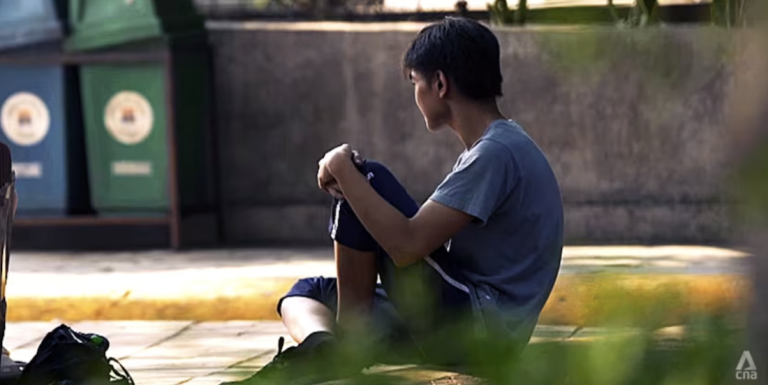
Manila — Christian Castillo, a 21-year-old job seeker from Quezon City, found solace during the pandemic in an unlikely companion: an AI chatbot named Andre.
“It felt like talking to a genuine human,” he recalls. But as his reliance on the virtual friend grew, his real-world connections faded. Castillo’s story mirrors a troubling trend among Filipino Gen Z—a generation grappling with profound loneliness in one of the world’s most socially vibrant cultures.
The Paradox of Connection
The Philippines, renowned for its close family ties and festive spirit, now ranks as the second-loneliest country globally, with Gen Z (born 1997–2012) bearing the heaviest burden. A 2023 Meta-Gallup report revealed that 57% of Filipinos feel lonely, far exceeding the global average of 24%. For youths like Castillo, the irony is stark: they are hyperconnected online yet emotionally isolated offline.
Contributing Factors

- Pandemic Fallout: The Philippines endured some of the world’s longest lockdowns, with in-person classes suspended until late 2022. Dr. Noel Reyes of the National Centre for Mental Health (NCMH) notes that isolation “elevated loneliness to alarming levels,” disrupting peer relationships critical to Filipino social identity.
- Social Media’s Double-Edged Sword: Filipinos spend an average of 3 hours and 34 minutes daily on social media—the fourth-highest globally5. While platforms like TikTok and Facebook offer fleeting validation, they often exacerbate feelings of inadequacy. “You see friends hanging out without you, and it worsens the loneliness,” admits Rafsanjani Ranin, a university student who scrolls late into the night.
- Parental Absence: Over a third of Filipino youth grow up without both parents, many of whom work overseas to support families. Clinical psychologist Violeta Bautista explains, “These children long for connection but lack guidance to navigate social needs.”
Mental Health Crisis
The consequences are dire. 35% of Gen Z Filipinos report depression, and 16% experience anxiety—rates higher than global averages410. Suicide ideation is rising, with nearly one in five youths aged 15–24 considering ending their lives1. Loneliness, as psychiatrist Dinah Nadera warns, “can morph into major depressive disorder, making sufferers resistant to help.”
Physical health is equally at risk. Chronic loneliness is as lethal as smoking 15 cigarettes daily, linked to a 30% higher risk of heart disease and weakened immunity.
The World Health Organization has declared loneliness a
global health threat, a reality felt acutely in the Philippines.
Breaking the Silence: Pathways to Hope
Despite systemic challenges, grassroots and governmental efforts are emerging to address the crisis:
1. Legislative Action
The 2018 Mental Health Law, bolstered by a ₱683 million ($15.8 million) budget allocation in 2024, aims to improve access to care14. The NCMH’s crisis hotline, launched in 2019, now fields 60 daily calls, though demand outpaces resources.
2. Community Advocacy
Initiatives like the Julia Buencamino Project use art workshops to destigmatize mental health. Buencamino, whose daughter died by suicide in 2015, emphasizes, “Communication is key. Parents must listen without judgment”410. Content creators like Keith Mirandilla leverage TikTok and YouTube to normalize conversations about loneliness, offering Gen Z a sense of belonging.
3. Reimagining Social Media
Brands and influencers are tapping into Gen Z’s desire for authenticity. Campaigns like Selecta’s Happinas—which promoted food-sharing during lockdowns—resonate by addressing isolation directly11. Meanwhile, AI companions like Replika, while controversial, highlight a craving for connection that experts urge redirecting toward human interactions.
4. Bridging Generational Gaps
BBDO’s research reveals that Gen Z values mental health awareness and inclusivity but feels misunderstood by older generations. Programs fostering intergenerational dialogue, coupled with employer support for work-life balance, could rebuild eroded social fabrics.
A Call for Collective Action
The loneliness epidemic demands a multifaceted response. Dr. Reyes stresses, “We must teach youths that loneliness isn’t a personal failure but a societal issue”10. For Castillo, hope lies in small steps: he’s now volunteering at community events, slowly rebuilding real-world bonds. “There are eight billion people out there,” he says. “Genuine friends are waiting.”
As the Philippines navigates this crisis, the resilience of its youth—and the nation’s famed bayanihan spirit—may yet turn the tide. The challenge is clear: to transform digital connectivity into heartfelt community, one conversation at a time.
For support in the Philippines, contact the NCMH Crisis Hotline at 0917-899-USAP (8727).
Gen Z in the Philippines: Why Do Filipino Youths Feel So Alone? (May 11, 2025)